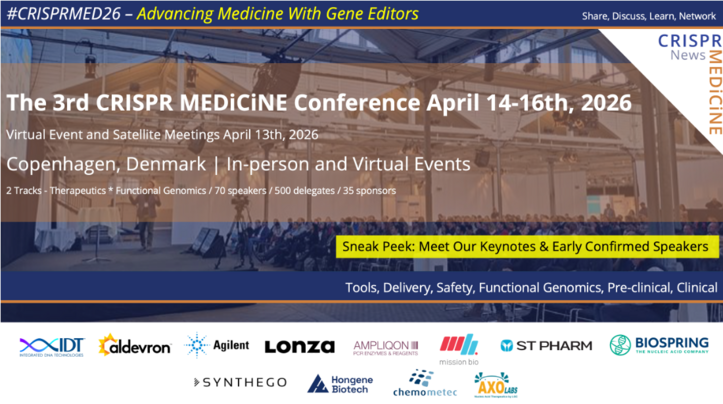CMN Weekly (5 January 2024) - Your Weekly CRISPR Medicine News
Top picks
- Epigenetics biotech Moonwalk Biosciences emerged from stealth this week with $57M in seed and Series A funding. The new company, backed by CRISPR pioneer Feng Zhang and former Illumina executive Alex Aravanis, plans to develop a pipeline of new treatments for a range of diseases, including chronic and aging-related conditions, based on using the cells’ natural regulation system to accurately and permanently control multiple genes in a single step without making changes to the genomic DNA sequence.
- Tome Biosciences announced this week that it has acquired Replace Therapeutics, a private biotechnology company developing a novel programmable genomic integration method capable of inserting and deleting small DNA sequences. According to a press release published by Tome, the newly acquired technology, known as ligase-mediated PGI (L-PGI), combines the site-specificity of CRISPR-Cas9 with the writing enzyme DNA ligase to precisely manipulate small DNA sequences. L-PGI technology is considered suitable for 10s to 100s of base pair DNA edits, complementing Tome’s flagship large DNA PGI technology, integrase-mediated PGI (I-PGI).
Research and reviews
- Researchers at the University of Connecticut Health Center have developed a CRISPR-powered aptasensor for the rapid and cost-effective detection of Alzheimer's disease (AD) biomarkers (Aβ40 and Aβ42) in cerebrospinal fluid (CSF) samples. In an article published recently in ACS Sensors, the team describes the novel aptasensor, which combines aptamers with CRISPR-Cas12a-based fluorescence detection for the sensitive detection of Aβ40 and Aβ42 within 1 hour. Clinical validation using CSF samples demonstrated the aptasensor's potential for accurate diagnostic classification of AD patients and healthy individuals, outperforming traditional ELISA methods.
- Using multiple CRISPR-Cas9 screens, a team of researchers in the Netherlands, Germany, and the United States identified translation of non-canonical open reading frames (ORFs) as a cancer cell survival mechanism in childhood medulloblastoma, which is the most common form of paediatric brain cancer. Dysregulation of RNA translation is a hallmark of high-risk childhood medulloblastoma, but it is unknown whether medulloblastoma dysregulates the translation of putatively oncogenic non-canonical ORFs. The new findings, published recently in Molecular Cell, highlight the importance of non-canonical ORF translation in medulloblastoma and provide a rationale to include these ORFs in future studies seeking to define new cancer targets.
- CRISPR/CAS as a powerful tool for HIV cure - a review. Researchers at Universidade de São Paulo in Brazil review progress in recent years involving the use of gene editing to cure HIV and prevent associated neurocognitive disorders.
- CRISPR/Cas9-mediated base editors and their prospects for mitochondrial genome engineering. Authors in Australia, Iran, Germany and the United States provide a detailed update on DNA base editors, including progress and remaining challenges.
- Gene therapy for mitochondrial disorders. The authors of this review detail the current state of application of gene therapy to primary mitochondrial disorders. Results from recombinant adeno-associated virus-based (rAAV) gene replacement approaches are covered, as well as refinements to nucleases that degrade mtDNA molecules with pathogenic variants, including transcription activator-like effector nucleases, zinc-finger nucleases, and meganucleases (mitoARCUS). The authors conclude their review with a discussion about the challenges of translating gene therapy in patients both from the point of view of achieving adequate organ transduction as well as clinical trial design.
The inaugural CRISPR Medicine Conference is getting closer!
The world's first CRISPR Medicine Conference is taking place in Copenhagen, Denmark in April 2024.
The event will bring European CRISPR research to the forefront, with 6 main tracks that cover the most important topics in the therapeutic gene-editing field: Tools, Delivery, Safety, Functional Genomics, Standards and Regulations, Pre-clinical Research and Clinical Trials.
Our keynote speaker is Luigi Naldini, Director of San Raffaele Telethon Institute for Gene Therapy (Italy)
Check out the incredible list of confirmed speakers here
See which companies, universities, research institutes and investors are attending here
Here are the important dates:
- January 12th, 2024: Early bird registration deadline
- January 24th, 2024: Abstract submission deadline
For registration details and more info, see here
Industry
- Scribe Therapeutics announced this week that it is expanding its in vivo collaboration with Sanofi to include a second, undisclosed target. Scribe is developing novel genetic medicines leveraging its CRISPR by Design™data-driven design and engineering approach to optimise its CRISPR-based platforms and assets including X-Editing (XE) technologies. Scribe announced its initial research collaboration with Sanofi for CRISPR-based cell therapies to address oncology indications in 2022, followed by an expansion of the collaboration in 2023 to advance in vivo medicines for genomic diseases.
- 4DMT and Arbor Biotechnologies announed in a press release published this week that they would establish a partnership to co-develop and co-commercialise up to six next-generation genetic therapies for brain diseases. To the partnership, 4DMT brings its repertoire of customised adeno-associated virus (AAV) vectors while Arbor contributes it proprietary AAV-compatible gene-editing toolbox and significant expertise within the central nervous system. The initial product candidate will be developed for a target in amyotrophic lateral sclerosis (ALS).
- In a press release published yesterday, Poseida Therapeutics highlighted recent progress as well as strategic priorities and anticipated 2024 key milestones. The company plans to report clinical data updates for its P-BCMA-ALLO1 (for multiple myeloma) and P-MUC1C-ALLO1(for solid cancers) allogeneic CAR-T programmes at scientific meetings in 2024. It also expects to dose the first patient in the Phase 1 P-CD19CD20-ALLO1 trial early this year.
- Allogene Therapeutics and Foresight Diagnostics announced yesterday that they will partner to develop a minimal residual disease (MRD)-based in vitro diagnostic for use in the Phase 1/2 ALPHA3 trial, which is the first pivotal trial for 1st line consolidation treatment of large B-cell lymphoma (LBCL). The ALPHA3 trial uses Foresight’s investigational PhasED-Seq™ ctDNA-MRD platform to identify patients with MRD after 1st line treatment for LBCL. The study will evaluate whether those patients benefit from consolidation with Allogene's TALEN-edited allogeneic CD19-targeting CAR-T therapy candidate cemacabtagene ansegedleucel, or cema-cel (previously known as ALLO-501A). If successful, cema-cel could become part of the 1st line treatment plan for newly diagnosed LBCL patients who are at a high risk for recurrence. Start-up activities for the ALPHA3 trial have been initiated.
- Allogene Therapeutics has announced its 2024 platform vision, which it believes will redefine the future of CAR -T cell therapies. The plans encompasses four core programmes for TALEN-edited allogeneic CAR T-cell therapies for leukaemia, lymphoma, autoimmune disease and renal cell carcinoma.
- San Diego-headquartered biotech startup CRISPR QC has announced a major boost to its Series A funding round, as Phoenix-based Xcellerant Ventures injects an undisclosed sum that is expected to fund further developments in the CRISPR QC's CRISPR Analytics Platform. The platform, which is powered by the CRISPR-Chip, allows CRISPR QC to analyse and optimise aspects of CRISPR editing before cell work, enabling researchers to save valuable time, money, and resources.
- Intellia Therapeutics highlighted its three-year strategic priorities as well as anticipated 2024 key milestones in a press release published this week. Core priorities include completion of Phase 3 study and biologics license application (BLA) submission for NTLA-2002 for the treatment of hereditary angioedema, completion of patient enrolment in the pivotal study of NTLA-2001 for the treatment of transthyretin (ATTR) amyloidosis with cardiomyopathy, and clinical validation of modular in vivo gene-insertion technology and advancement of earlier-stage pipeline and platform innovations.
42nd Annual J.P. Morgan Healthcare Conference
The 42nd Annual Healthcare Conference will take place on January 8-11, 2024 in San Francisco, CA. Gene-editing companies confirmed to present at this conference include:
- Allogene Therapeutics (press release)
- CRISPR Therapeutics (press release)
- Editas Medicine (press release)
- Verve Therapeutics (press release)
- Prime Medicine (press release)
- Scribe Therapeutics (press release)
- Beam Therapeutics (press release)
- Vertex Pharmaceuticals (press release)
- Arsenal Bio (press release)
Commentary
A society-wide conversation is needed about germline genome editing using CRISPR. Ewan Birney, director at European Molecular Biology Laboratory and European Bioinformatics Institute, comments on special circumstances in which germline genome editing could be allowed, provided that broad societal discussion is supported by national and transnational legislation.
News from CRISPR Medicine News
- Don't miss our end-of-year clinical highlights from the gene-editing field! 2023 was a spectacular year, with the first approval for a CRISPR therapy, base editors in the clinic with positive early clinical data, and the first clinical trial of an RNA editing therapy. Read the highlights here.
To get more CRISPR Medicine News delivered to your inbox, sign up to the free weekly CMN Newsletter here.
Tags
ArticleMissing linksNewsCMN WeeklyAllogene Therapeutics, Inc.Arbor BiotechnologiesCRISPRQCIntellia Therapeutics, Inc.Poseida TherapeuticsScribe Therapeutics
CLINICAL TRIALS
Sponsors:
Suzhou Maximum Bio-tech Co., Ltd.
Sponsors:
Zhejiang University







